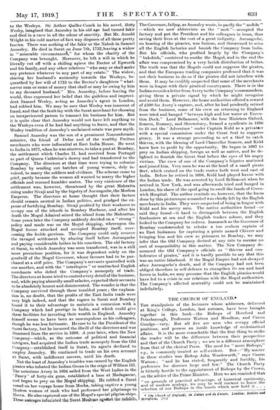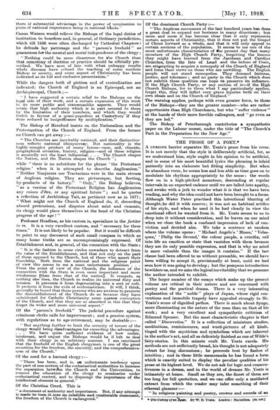THE CHURCH OF ENGLAND.*
THE standpoints of the lecturers whose addressee, delivered at King's College, London, last autumn, have been brought together in this book—the Bishops of Hereford and Peterborough, Professors Watson and Headless, and Canon Goudge—vary. But all five are men who occupy official positions, and possess an inside knou ledge of ecclesiastical affairs. It is the more remarkable that the first thing to strike the reader will be the difference between their perspective and that of the Church Party ; we arc in a different atmosphere from that of the clerical Press. The need for "more Bishops," e.g., is commonly treated as self-evident. But—" My master in these studies was Bishop John Wordsworth," says Canon Watson ; "and he has stated, frequently and forcibly, his preference for dioceses large and few." The Church Party is bitterly hostile to the appointment of Bishops by the Crown, on the advice of the Prime Minister. Here we are reminded that
"on grounds of practical advantage, of historical continuity, and of modern analogy, we may be well content to leave the selection of our Bishops in the hands which now hold it . . .
• The ChuleA of England; de Satan and di Inlarc• leaden; lioddiauJ 8tce00% ISM
there iif substantial advantage in the power of nomination to poste of national importance being in national hAnds."
Canon Watson would relieve the Biehops of the legal duties of institution to beneficee and, in general, of Ordinary jurisdiction, which till 1836 were often discharged by Cathedral Chapters ; he defends lay patronage and the "parson's freehold" as guarantees for the mental and moral independence of the clergy : "Nothing could be more disastrous for the Church than that monotony of doctrine or practice should be officially pre- scribed. We have seen of late with what unhappy results whole dioceses have echoed the teaching of some resolute Bishop or society, and some aspect of Christianity has been indicated as its full and exclusive presentation."
While the dangers both of pietism and of centralization are indicated; the Church of England is an Episcopal, not an Archiepiscopal, Church ;— " I have suggested a certain relief to the Bishops on the legal side of their work, and a certain expansion of this work in its more public and statesmanlike aspects. They would retain that high authority which is in part secured to them by the limitation of their numbers, and which they would forfeit in favour of a quasi-popeclom at Canterbury if they were reduced to insignificance by multiplication."
The Bishop of Hereford insists on the Nationalism and the Protestantism of the Church of England. From the former no Church can get away :—
"The Churches are inevitably national, and their distinctive- ness reflects national idiosyncrasy. But nationality is the highly complex product of many forces—race, soil, climate, geographical situation, history, religion--and of these religion- is assuredly not the least influential. . . . The Church shapes the Nation, and the Nation shapes the Church " ; while "there is no substitute for the phrase 'the Protestant religion' when it is attempted to describe Anglicanism." "Neither Nonjurois nor Tractarians were in the main stream of Anglican religion. They are picturesque, but fleeting,. by-products of its history." "Only," the Bishop. believes, , " as a version of the Protestant Religion has Anglicanism any raison d'hre, or any spiritual future " ; and he quotes a reflection of Archbishop Tait, as pertinent now as in 1877: "What might not the Church of England do, if, discarding absurd pretensions, and disputes about mint and cummin, its clergy would place themselves at the head of the Christian progress of the age ! "
Professor Headlam, as his custom is, specializes in the fortiter in re. It is a very excellent custom, and "necessary for these timea." his not likely to be popular. But it would be difficult- to point to any document of such small compass in which so many home truths are so uncompromisingly expressed. Of Establishment and, in general, of the connexion with the State.: " It is the fashion in some circles nowadays to detract from the value of the Establishment, and that not only on the part of those opposed to the Church, but of those who assert their friendship. Both from the national and the religions point- of view this seems to me a most unfortunate position . . . From the point of view of the Church, the influence of the connection with the State is even more important and more wholesome [then from that of the nation]. It compels, as nothing else does, the Church to realize its universal duty and mission. It prevente it from degenerating into a sect or cult. It protects it from the evils of ecclesiasticism. It will, I think, generally be found that those persons who are anxious to promote the disestablishment of the Church do so because they have substituted for Catholic Christianity some narrow conception of the Church, and that they are so absorbed in this that they forget its wider and more universal aspect."
Of the "parson's freehold." The judicial procedure against criminous clerks calls for improvement ; and a pension system, with regulation's as to age-retirement, may be desirable :— "But anything further to limit the security of tenure of the clergy would bring disadvantages far exceeding the advantages. . . . We have quite sufficient evidence of how unfair, intolerant, and unjust the Bishops would be if left to deal with their clergy in an arbitrary manner. I am convinced that the freehold of the English clergyman is one of the great securities for the freedom, the sincerity, and the comprehensive- ness of the Church."
Of the need for a learned olergy
"There has been, and is, an unfortunate tendency upon the part of one section of the ecclesiastical authorities to increase the separation between the Church and the Universities, to remove the education of the clergy to seminaries under ecclesiastical control, and to (fispansge the importance of the intellectual element in general."
Of the Christian Creed. This is " a dooument of-authority and importance. Hut, if any attempt is 'made reo-turn-it-intoact infaflible..ancl =alterable statement, the freedom of the Church is endangered." Of the dominant Church Party :—
" The Anglican movement of the last hundred years has done a great deal to .expand our horizons in many directions ; but more and more it has become clear that it only represents certain aspects of Christianity, that it does not put the Gospel of Christ forward as a whole, and that it will only appeal to certain sections of the population. It seems-to me one of the most unfortunate characteristics of the present day that many members of the High Church Party, forgetting the lessons they might have learned from the Jacobean and Caroline Churches, from the fate of Laud and the failure of eosin, are attempting to acquire a monopoly of the Church of England and forte their views on those who are unwilling. The Farlish people will not stand monopolies They demand fairness. justice, and tolerance ; and no party in the Church which does not exhibit these qualities can hope to preserve its influence. If the High Church Party, or any seetion of it—if the High Church Bishops, for to them what I say particularly applies, forget this, they will inflict very grave injuries both on their own ideals and on the Church of England."
The warning applies, perhaps with even greater force, to those of the Bishops—they are the greater number—who are rather opportunists than High Churchmen, but who "suffer violence" at the hands of their more-forcible colleagues, and "go even as they are led."
The Bishop of Peterborough contributes a sympathetio paper on the Labour unrest, under the title of "The Church's Part in the Preparation for the New Agee."



































 Previous page
Previous page